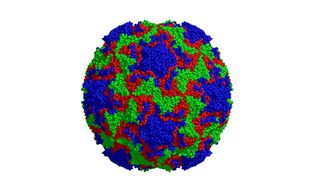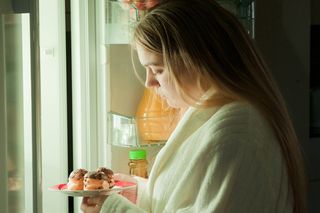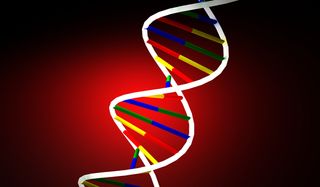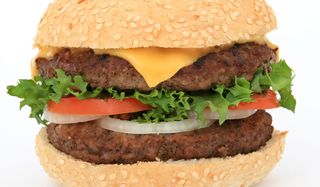11 Surprising Things That Can Make Us Gain Weight
Intro

Eating too much and not exercising may be the main causes of obesity, but it turns out they aren't the only things that build the bulge.
Studies have shown the most unexpected things can pack on pounds from getting your tonsils out, to having a whole array of "obesity genes."
These days, 1 in 3 U.S. adults is overweight or obese, according to the Centers for Disease Control and Prevention, so every factor counts in the fight against extra pounds.
Take a look at 11 surprising things that could be making you gain weight.
Catching one strain of the cold virus

Children exposed to a particular strain of the common cold virus called adenovirus 36 are more likely to be obese than those not exposed, according to findings in the journal Pediatrics in September. In a study of 124 children, nearly 80 percent of those exposed were obese. They weighed an average of 50 pounds (23 kilograms) more than kids not exposed.
Turning on the A/C

When living in constantly comfortable temperatures, the body doesn't have to work to keep cool or warm, according to a 2006 article in the International Journal of Obesity. In the South, a region with some of the highest obesity rates in the United States, the percentage of homes with air conditioning increased from 37 percent in 1978 to 70 percent in 1997, the study said.
Having a working mom

Kids with a working mom are more likely to be obese than kids whose moms stay home, according to study published in May in the American Journal of Epidemiology. University College London researchers followed 8,552 kids in 1965 and compared their weights to 1,889 children in 1991. They found the 1991 children whose moms worked were more likely to be obese than children whose moms stayed at home. However, researchers caution, they didn't examine diet or physical activity, which are likely to partially account for the results.
Not getting enough sleep

People who don't get enough sleep increase their risk of being obese, according to a 2007 study in the journal Archives of Disease in Childhood. A number of hormonal changes such glucose intolerance, a precursor to diabetes occur when the body doesn't get enough rest, the study said. Sleep restriction can spur hunger, and the tiredness that follows can decrease physical activity, leading to further weight gain, according to a 2009 study in the journal Critical Reviews in Food Science and Nutrition.
Getting your tonsils out

Researchers from St. Louis University in Missouri found kids who get their tonsils removed gain more weight after the procedure than kids who don't have the operation. The researchers, who reviewed nine studies published between 1970 and 2009, found increased weight and body mass index (BMI) could be seen for up to seven years after the operation. BMI increased by 5.5 percent to 8.2 percent after surgery. If the operation relieves other health problems brought about by tonsillitis, it might increase a child's appetite, the researchers said.
Keeping the light on at night

Keeping a light on at night could add a few inches to your waistline, according to a study published in October in the journal Proceedings of the National Academy of Sciences. Mice exposed to dim light at night gained 50 percent more weight over an eight-week period than mice that spent their nights in total darkness, even though all the mice had the same amount of food and physical activity. The results could apply to people who eat meals late at night, the researchers said.
Having an older mom

Older moms are more likely to have obese kids, according to numerous studies. A 2007 study in the journal Archives of Disease in Childhood found children born to women ages 30 or older had 2.6 to 2.8 percent more body fat than children born to women younger than 25. And a 1997 study in the Journal of the American Medical Association found obesity was higher among 9- and 10-year-old girls whose moms gave birth after age 35, compared with girls whose moms gave birth when they were 21 or younger.
Being exposed to environmental contaminants

Pollution could have an impact on your body's metabolism, according to studies published in the journal Critical Reviews in Food Science and Nutrition and the International Journal of Obesity. Endocrine-disrupting chemicals -- such as bisphenol A, which is found in plastic, and polybrominated diphenyl, which is a flame retardant -- have been found in humans and are associated with obesity by interfering with hormone signaling, the study said. Pesticides that affect hormone synthesis and metabolism can also make their way into humans by going up the food chain.
Your genes

Scientists identified 18 new genetic markers that could play a role in obesity, and 13 new markers that could determine whether fat builds around the waist or the hips, according to two studies published this month in the journal Nature Genetics. Many of these markers are in or near genes not previously connected to obesity, and by learning what these genes do, scientists may find causes of obesity in different people, the researchers said.
Having a mom who ate a high-fat diet during pregnancy

Researchers from the University of Cincinnati and the Medical College of Georgia found mice fed a high-fat diet were more likely to have oversized babies than those fed a normal diet, according to a 2009 study in the FASEB Journal, and being oversized at birth was a risk factor for obesity later in life. The mouse babies were oversized because fat consumed by the mother causes the placenta to provide too many nutrients to the fetus, the study said. The researchers said the findings could apply to humans.
Sign up for the Live Science daily newsletter now
Get the world’s most fascinating discoveries delivered straight to your inbox.

